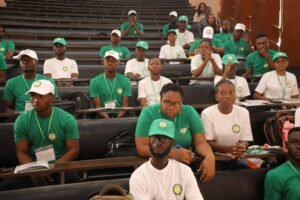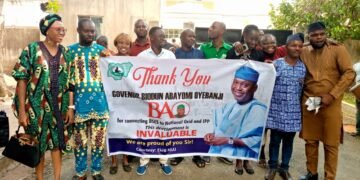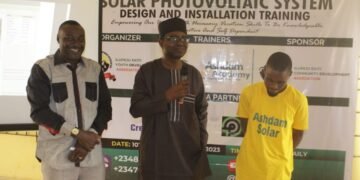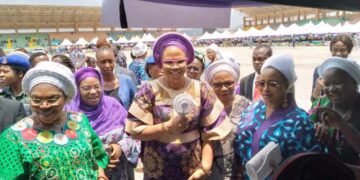The National Information Technology Development Agency, (NITDA) has commenced training of 75 farmers that are to be absorbed on the National Adopted Village for Smart Agriculture platform.
The five days training started at the University of Ibadan, Oyo State aimed at improving the production and the productivity of every NITDA adopted farmers on the NAVSA pplatform and also increase their income.

The NITDA Director General, Kashifu Inuwa, CCIE who was represented by the team leader and Assistant Director, Digital Economy Development Director, Dr Ayodele Bakare in his opening remarks disclosed that the project is designed to help the farmers raise their efficiency, effectiveness and profitability of their farm businesses through the adoption of digital technologies.
He stated that the adoption of technologies in agricultural practice have helped in food sustainability especially the developed country adding that for Nigeria to also achieve the same feat, it must adopt technologies in all the agricultural value chain.

He said, “For us to be successful, this programme is going to be implemented in two folds. One, we are going to be training you on application of digital technologies in the enablement of value chain in agriculture and two, we are going to be implementing a smart farm which includes smart brooding, smart irrigation, use of drones for area mapping and the provision of digital platform to effectively manage the smart farm.”
He stressed further that the essence of the training is for the beneficiaries to be able to manage their smart farms and become self reliance and self employed.
While advising the beneficiaries to take the training serious, saying “NITDA and University of Ibadan have put tremendous efforts into the project. He called on the institution to consider expanding the scope beyond what NITDA has originally created it for and ensure its sustainability so it can continually achieve its goals and objectives.

The Vice Chancellor of the University of Ibadan , Prof Kayode Adebowale who was represented by Prof Oladepo Okhare expressed delight over the project and commended NITDA for finding the University worthy of the programme.
He maintained that the world has become a global village where adoption of Information Technology in agricultural practices would not only guarantee access to information but increase the potentials of farmers.
He said, “Smart farming is proliferating globally and in Nigeria we are about to start, the potentials are here and I would have loved to see more students here than we have seen today. I think after this programme, there is a need to extend it to the other departments like Engineering just like you have done to Computer Science. There is need for integration, optimisation and synthesis of knowledge.

While admitting that the new curriculum for the university education should include entrepreneurial contexts, the Vice Chancellor commended NITDA for being proactive in working in that direction already by collaborating with tertiary institutions in building the human capacity and promoting entrepreneurial skills of the students.
“We need to have a lot of collaboration and as we had done in the past but either from your side or our side, we are sometimes stagnant and I think the bond can still be strengthened, our students are ready to work and it is about the future.

Earlier, the representative of the Dean, Faculty of Agriculture, Prof. Oladeji Oyinlola applauded the position of NITDA to collaborate with the University describing it as a welcome development. “Collaboration has been position of the university since its inception and in this regard is so novel because developed countries of the world now employ the use of Information technology to enhance food security,” he added
He said, “NITDA is therefore providing a real privilege for the university on a platter of gold. NITDA, in its quest to intervene agriculture development of the nation recently introduced NAVSA. This digitally artificial project is conceived to facilitate the development of agricultural enterprises.”

While accepting that the programme would go a long way in exposing the students to modern trend in agricultural practices especially in the use of information and computer technology for agriculture, Prof Oyinlola noted that the programme provided for the beneficiaries smart devices, seed funding, capacity building in four different enterprises among others.
He listed other components the programmes provides to include: provision of connectivity to the beneficiaries, access to NAVSA platform facilitation, financial inclusion through the digital wallets on the NAVSA platform, provision of insurance and E-extension services, Provision of smart demo farm, that is smart irrigation and brooding system, a borehole that has already been donated for the project at the University satellite farm in Ile-Ogbo, installation of smart irrigation system by NITDA, a 500 litre water tank, one Horse Power surface water pump, and solar inverter installed to utilize the small irrigation system.
He appreciated the Honourable Minister of Communications and Digital Economy, Prof. Isa Ali Ibrahim Pantami and the NITDA’s Director General, Kashifu Inuwa, CCIE for approving the school as beneficiary of the programme.






























